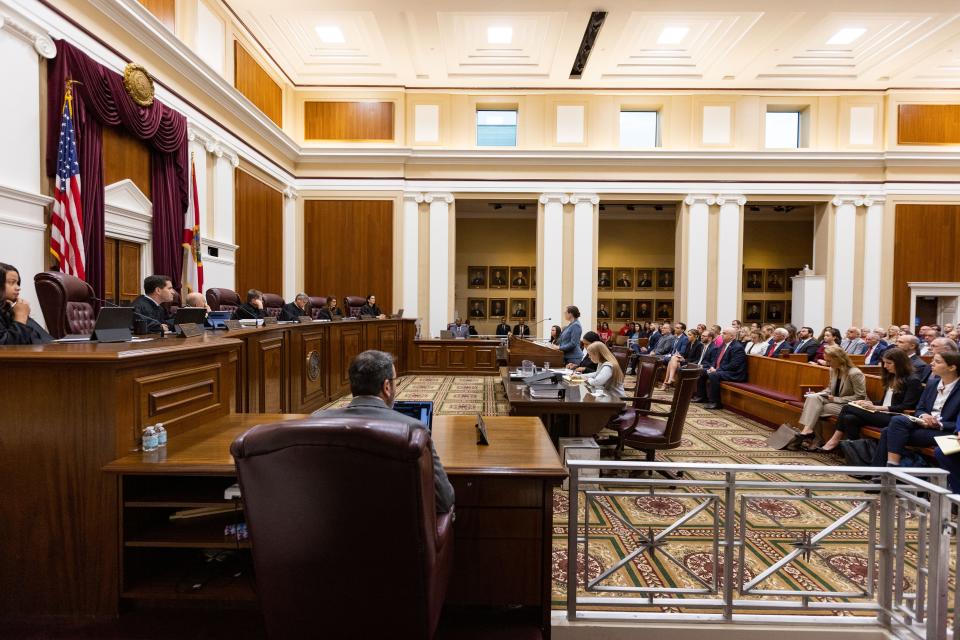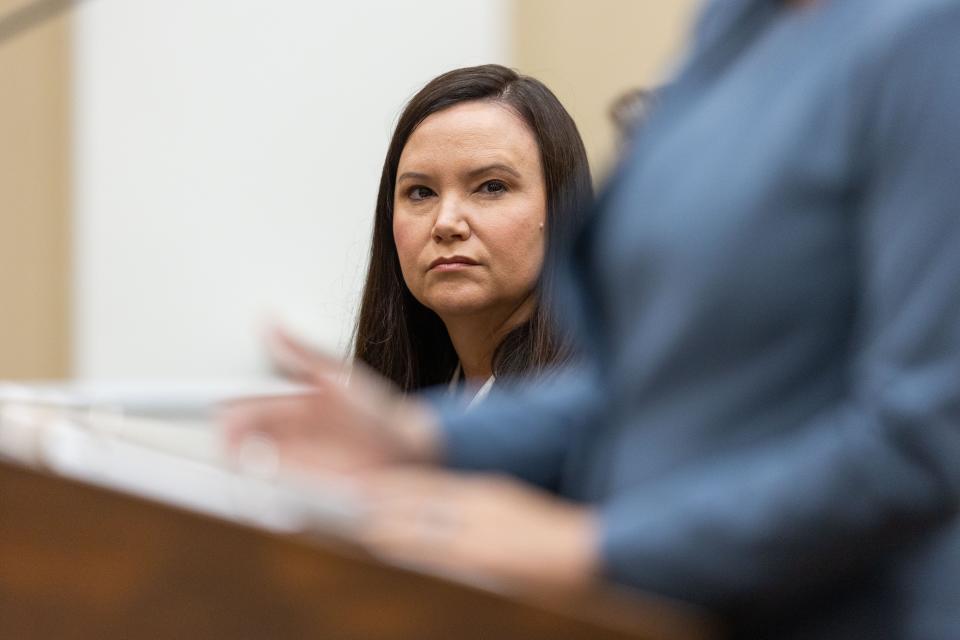Howard Simon: How a Supreme Court case could shape Florida's privacy future
- Oops!Something went wrong.Please try again later.
Apologies, but someone needs to deliver the bad news that we may be about to lose our right to privacy.
Privacy or “the right to be let alone,” as Justice Louis Brandeis put it almost a hundred years ago, is “the most comprehensive of rights and the right most valued by civilized [people].”

In 1980, the people of Florida secured protection for their privacy with an amendment to their state constitution. It is Article 1, Section 23: “Every natural person has the right to be left alone and free from governmental intrusion into his private life except as otherwise provided herein...”
Five years later, our Supreme Court noted that the provision was phrased in broad terms “in order to make the privacy right as strong as possible.” And nine years after its adoption, the Supreme Court, unanimously, ruled that freedom from government intrusion into “one’s private life” applied to women seeking to terminate a pregnancy.
Now, the justices of the Florida Supreme Court are deciding how a legislative 15-week abortion ban (which triggers a 6-week ban, which in practical terms is a total ban) can possibly be legal when there is a constitutional prohibition on intrusions into a woman’s private life.
Florida Attorney General Ashley Moody has suggested how the hypocrisy can be accomplished: ignore three decades of precedent and shrink the meaning of privacy to “informational privacy” only – so that it only restricts information government collects and disseminates about a person.
More: Florida’s attorney general vows to challenge language in abortion initiative
That approach, however, comes with a stiff price for every Floridian, namely the loss of constitutional protection for many areas of personal freedom.
If the state Supreme Court ignores decades of precedent and adopts Moody’s destructive proposal to shrink the meaning of privacy, then protection for other fundamental rights also will disappear.

Protection from the misuse of our personal information by government agencies is, of course, important, but Florida’s Privacy Amendment also helps keep government out of our personal freedom by protecting us from:
government surveillance of private spaces,
government scrutiny of personal activities in our own homes,
intrusion into our private medical decisions, everything from birth control to end of life care,
genetic testing and screening,
interference with the right to marry and engage in adult consensual intimate relations,
government intrusion into decisions about parenting and child-rearing, and
discrimination in public employment based on our private activities.
We will not lose these rights all at once.
But if the Supreme Court turns its back on more than three decades of precedents and ends the broad embrace of privacy by shrinking our right to privacy to “information privacy” only, the legislature will be free to regulate our personal lives in each of these areas.
And, unless you’ve been off the grid for the last several years, you will have noticed that our legislature has trouble distinguishing between regulating and restricting.
Stability and respect for our judicial system requires that constitutional principles and the law do not lurch in different directions depending on who happens to be interpreting the law. We can always hope for a show of respect for the work of the Supreme Court justices who preceded those now sitting on the bench, especially in this case over the last three decades.
Former Supreme Court Justice Sandra Day O’Connor was a shining example of the kind of integrity that elicits respect for the judiciary and enhances the legitimacy of the courts in the eyes of the public.
Perhaps the best example is described in the recent biography of Justice O’Connor by the legal historian Joan Biskupic, who discusses Justice O’Connor’s thinking when she confronted the issue of abortion in the 1992 Casey case. Biskupic notes that “If Justice O’Connor had been on the bench in 1973, she might not have voted for Roe. But by the time of the 1992 case, she said that since Roe had been the law for so long and many women had come to depend on it, there was no going back."
Regardless of how the Court rules, there’s work we can do to safeguard our freedoms. Courts will have a harder time ignoring our rights if our state constitution explicitly limits government interference in abortion.
Go to the website of Floridians Protecting Freedom, the group leading the petition drive to put the right to abortion on the ballot, https://floridiansprotectingfreedom.com/
Download, sign and mail in your petition, and
Make a contribution.
“It is incumbent on every generation to pay its own debts as it goes,” Thomas Jefferson observed.
This is now our time to defend freedom.

Howard L. Simon is interim director of the American Civil Liberties Union of Florida. He served as the executive director from 1997 – 2018.
JOIN THE CONVERSATION
Send letters to the editor (up to 200 words) or Your Turn columns (about 500 words) to letters@tallahassee.com. Please include your address for verification purposes only, and if you send a Your Turn, also include a photo and 1-2 line bio of yourself. You can also submit anonymous Zing!s at Tallahassee.com/Zing. Submissions are published on a space-available basis. All submissions may be edited for content, clarity and length, and may also be published by any part of the USA TODAY NETWORK.
This article originally appeared on Tallahassee Democrat: How a Supreme Court case could shape Florida's privacy future

